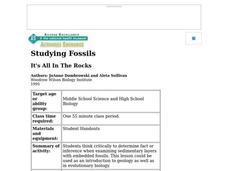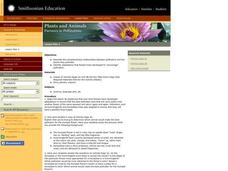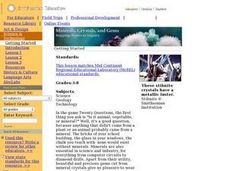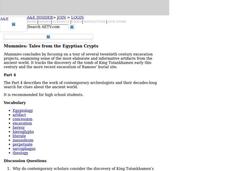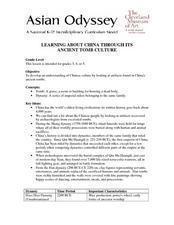Curated OER
Baga Drum
Learners examine a Baga Drum in order to explore the history of the Baga people of West Africa. In this art history lesson, students recognize figures used in Baga Drum design that represent aspects of Baga culture. They also design and...
Curated OER
It's All in the Rocks
Students think critically to determine fact or inference when examining sedimentary layers with embedded fossils. They are being introduced to geology as well as evolutionary biology.
Curated OER
Effigy Mound Activity
Learners research effigy mounds of Native people in Wisconsin. They create large models of effigy mounds in a given area based on factual information from their studies and research.
Curated OER
Making Prehistory
Young scholars create mock fossil records based on current scientific theories about prehistory. By learning about what fossil records teach us about different prehistoric time periods, students gain a greater understanding of theories...
Curated OER
Taming the Wild Aurochs
Sixth graders read and discuss the domestication of animals in history. In this Aurochs reading lesson, 6th graders define vocabulary and list similarities and differences between wild and domesticated animals. Students complete an...
Curated OER
Plants and Animals: Partners in Pollination
Young scholars describe the complementary relationships between pollinators and the plants they pollinate, identify adaptations that flowers have developed to "encourage" pollination, and create and draw their own "designer" flowers.
Curated OER
How To Find a Site
Fourth graders identify the three basic needs of humans. They identify on a map the best places to live and make a list of items that they can find on a map - streams, river, hills, plains, forests, etc.
Curated OER
Prehistoric Indians
Fourth graders identify the four Native American groups of Wisconsin. They compare the four groups through discussion and list the four groups with their tools, food, shelter, and time period.
Curated OER
Going...going...gone? Tropical Rainforests-How They Work, What They Do for Us, What's Being Done to Them...
Sixth graders explore the Tropical Rainforest and come to understand what it is and how it affects the ecosystem. In this rainforests lesson, 6th graders write about the Tropical Rainforest, imagine they are in the Tropical Rainforest,...
Curated OER
Pleistocene Mammals
Students research the causes of the extinction of Pleistocene mammals. In this Pleistocene mammals lesson, students read essays to understand the Pleistocene epoch. Students write an essay about the personal impact of this...
Curated OER
Ice Age Animals
Students research the ice age and the animals that were on the Earth at that time and have a debate on the explanation for the extinction of the ice age animals.
Curated OER
Minerals, Crystals, and Gems
Learners discover the relationships between minerals, crystals and gems. They bring in rocks that they find at home, in the schoolyard, etc. and examine them and attempt to identify them. They set up a classroom exhibit that includes all...
Curated OER
Let's Go To The Movies
Students explore technology used in making movies. In this movie making lesson, students investigate how technology has improved in the entertainment industry. Students discover how simple tools are combined together to make complex...
Curated OER
Plants and Animals: Partners in Pollination
Students identify the plant parts and bee structures that are involved in pollination. They simulate pollination in a group activity and process the information.
Curated OER
Mummy Tales
Students research types of mummification. In this burial customs lesson, students work in groups to research different types of mummies and present their research to the class. Students compare and contrast the types of mummification.
Curated OER
Atlatl (Native Americans)
Learners discover what an atlatl is and how to use it. In this Native American lesson, students discuss the history of the Native American atlatl and practice throwing with it. Learners will analyze the effects of the atlatl in terms of...
Curated OER
Mummies: Tales from the Egyptian Crypts Part IV
Students choose one or two of the artifacts found in King Tutankhamen's tomb and describe and analyze the artifact. Explain what it tells us about Tutankhamen's life and about ancient Egyptian culture.
Curated OER
It's All In The Rocks
Students think critically to determine fact or inference when examining sedimentary layers with embedded fossils. Geology and evolutionary biology are introduced. They individually write a story about various diagrams and share their...
Curated OER
China's Ancient Tomb Culture
Students research and discuss Chinese history through the examination of ancient tomb artifacts. Emphasis is placed on the creation of student posters displaying "what they would put in a tomb".
Curated OER
Decomposing Artifacts
Seventh graders participate in an experiment in which they calculate the time of decomposition of different materials. In groups, they fill bags with different materials and cover them in soil. After six months, they create a line graph...



